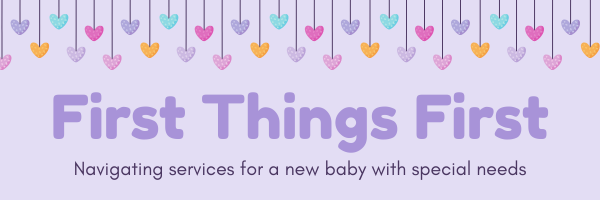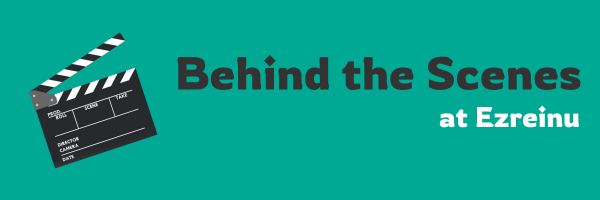
Right after childbirth, everything is overwhelming. But when a child is born with special needs, the stress reaches a whole new level.
What do I need to set up right away, and what can wait?
Will it be harmful to my baby if I wait a bit before jumping into the daunting world of bureaucracy?
Is there anything I should take care of before leaving the hospital?
There are so many questions. Parents often feel anxious and guilty, not knowing if they could or should be doing more from Day One.
Many of you readers, whether you’ve been there before yourself or you’ve supported others who have been, are often turned to for answers. We’ve compiled the basic information here in clear and simple terms so that no parent should feel alone during this vulnerable time.
No two situations are the same. The information provided below is for educational purposes. There are many wonderful organizations which can help new parents of babies with various needs. Parents are encouraged to reach out to our office at 718-750-1010 for personalized guidance and referrals.

Nursing
For a child who has complex medical issues which require constant monitoring, you may be able to get Private Duty Nursing (PDN) at home covered by your insurance.
Round-the-clock nursing is generally only provided for higher needs, like for child who has a trach or is oxygen-dependent. Some infants who receive continuous feeds through a G-tube or NG-tube might qualify for nursing as well, but not every agency or insurance will allow it.
The easiest way to apply for nursing is to go through the NICU social worker before your child is discharged from the hospital.
If you’ve already left the hospital, you can apply directly to a nursing agency. The agency will provide an assessment. At the end of the day, insurance will make the call if your child is eligible at all, and how many hours of nursing your child will receive.

Home Care
Even if your baby does not qualify for nursing, most children with chronic health conditions can get home care. An HHA (Home Health Aide) can come to your home and provide basic care for your baby. Bear in mind that an HHA officially cannot do medical-related tasks for your child, such as managing a feeding tube.
The process in much the same as applying for nursing: Go to the NICU social worker before discharge, or apply directly to a home care agency.
For home care, your child’s doctor will have to fill out and submit an M-11Q form:
As with nursing, insurance will determine if your child is eligible for home care and make the determination of how many hours they will receive.

Early Intervention
Everyone knows that it’s important to start therapy at a young age for children who are expected to exhibit developmental delays.
How young is young? That’s depends.
If you want to start when your baby is just a couple of weeks old, no one is stopping you. But if you want to give yourself a month to recover and get back to yourself first, that’s generally not going to make or break your child’s developmental future.
That being said, when there is a survival issue at stake, such as breathing or feeding difficulties (among others), it’s vital to start with interventions as soon as possible.
The process for receiving EI services is straightforward.
Refer to our previous newsletter on navigating EI services for more details.🔻

Care Management
Getting care management is a good idea, but it’s not on the urgently-must-get-this-done list.
Having a care manager to turn to for questions and advice regarding Medicaid services is a great thing. Care management comes through the Health Home system. Call Ezreinu at 718-750-1010 for a Health Home referral.
If your child qualifies for Children’s Waiver/HCBS services, your care manager will help you through the process. If your family doesn’t qualify for income-based Medicaid, your care manager can help your child receive disability-based Medicaid through the HCBS Waiver.
Many children with special needs benefit from OPWDD, the NY lifelong support services for people with developmental delays. Although services will only begin at an older age, and it may take time and effort until your child receives those services, applying for OPWDD and just receiving eligibility to keep in your back pocket is a good idea.
Call Ezreinu at 718-750-1010 for an OPWDD agency referral.
Thank you to Surie Morgenstern of Pillar Support for providing information for this newsletter. Pillar Support is a Hamaspik program which provides prenatal and postnatal guidance and support for parents of children with genetic medical conditions. Surie can be reached at 718-387-8400 Ext.122.

New in Ezreinu
This past Monday, Ezreinu hosted a pre-camp webinar for parents who are sending their children with special needs to camp. The webinar was well-attended, with over 50 parents registered.
Experienced camp directors Bluma Bar-Horin, Simi Zanger, and Perry Binet shared valuable tips and advice for parents, focusing on both the practical and emotional aspects of sending children with special needs to camp.
Many happy participants shared with us how informative, helpful, and inspirational they found the webinar.
We look forward to hosting more educational webinars in the future.

Roizy, a fun, energetic little girl with special needs, keeps her family on her toes. Though her family loves her to pieces, being on top of her, especially outside of their own home, is very difficult. Ezreinu arranged a volunteer to come and help out with Roizy over the upcoming Yom Tov, and her family is now able to go away for the first time in several years.⬛
The Weissbergs were considering a move to a different city, but they were at a loss at to what to do with Nochum, their 8 year old son with ASD who was doing well in his current school. They called Ezreinu, and they received detailed information about an excellent school option near their new home, which they are now looking into for Nochum.⬛
Liked this post?
Get bi-weekly Ezreinu Updates directly to your inbox.
